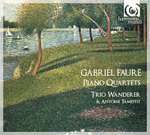|
Back
02/11/2010
Gabriel Fauré: Piano Quartets
Trio Wanderer: Vincent Coq (piano), Jean-Marc Phillips-Varjabédian (violin), Raphaël Pidoux (violoncello) – Antoine Tamestit (viola)
Recorded in Austria (2010) – 62’31
Harmonia Mundi #902032 – Booklet in English with original French texts and English and German translations

By age nine he was admitted to the Ecole Niedermeyer, a spawning ground for up and coming choirmasters and organists. Pamiers-born Gabriel Fauré (1845-1924) was then introduced to Camille Saint-Saëns and his influences in the latest French music. Accepting his first position as organist in Rennes in 1865, Fauré returned to Paris the following year to serve as principal organist at Saint-Sulpice. One can therefore can see a logical progression into piano and chamber music. The aforementioned genre was eclipsed by opera, the more heavily favored art form among Parisians during the late 19th century. Although Fauré dabbled in this world, one being the warmly received drame lyrique, Pénélope (1913), he’s better recognized for pieces outside this realm.
Fauré shied away from the immensity of symphony and orchestra, finding greater comfort in a more intimate musical niche. This brings us to two of Fauré’s tacit works which are splendidly presented on this recording by the Trio Wanderer. Created in 1987, this gifted French team’s creation of Piano Quartets is a natural fit. The Piano Quartets in C minor and G minor have similar parallels, yet merit brief commentary.
No. 1 Opus 15 in C minor is a bit lighter and less edgy in comparison to the second (piece). We can hear the members’ attentive sound balance as Coq’s pleasing rolling arpeggios undulate and the strings respectfully draw harmonic overtones. The opening movement occasionally jumps from minor to major, giving a sense of hopeful happiness and childlike simplicity. It expectedly extends into the scherzo allegro vivo with nimble roulades. Suddenly, we delve into Fauré’s more solemn contemplation, the adagio, only to find us returning to pulsating lines which are beguiling and intriguing. Each member of the group treats the music with clairvoyant protocol and interpretation.
By contrast, Fauré initiates No. 2 Opus 45 in G minor with brooding somberness, masterfully weaving variations on a theme in subtle fashion. Those changes are distinguished without a single overbearing dominance. The first movement moves along with searing anguish and emotional trauma. Immediately following is the scherzo allegro molto resounding with vacillation, a momentum continuing well into the adagio non troppo. Fauré envelopes us in a state of anxiousness and unsettledness that’s well realized in the Trio Wanderer’s amazing level of razor sharp dynamics. Despite the section laden in sorrow, it’s soon replaced by an animated musical dialogue between strings and piano which leads us to the finale featuring a festive rolling tempo.
Existentialism is synonymous with the Trio Wanderer, connecting with Fauré like no other. You’ll find yourself returning to Piano Quartets to discover an auspicious aura. Garnering numerous awards and performed with some of the finest in the classical vein, this CD compilation is worth its weight in gold.
Christie Grimstad
|